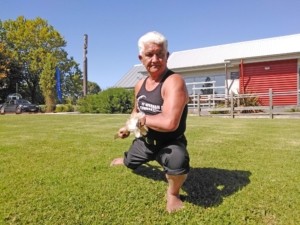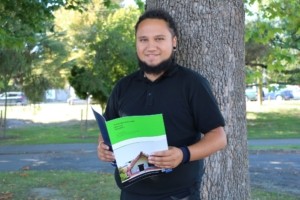Nothing what 69-year-old Tipene Rangihuna is doing now, was in his plan for retirement. “I was looking forward to staying at home, riding horses and relaxing,” says Tipene.
When three years ago Pāpā-T, as he is widely known, was asked by EIT’s Te Ūranga Waka if he would take on a te reo Māori class within the high security unit of Hawke’s Bay Regional prison, he agreed. Little did he know, how much this activity would soon mean to him.
Pāpā-T is of Ngāti Porou descent and grew up in Gisborne. For a long time he lived in Waiwhetū close to Wellington. His children attended the local kōhanga reo and Pāpā-T became the first male kōhanga reo teacher in New Zealand. Pāpā-T immersed himself more and more in Māori culture and dedicated himself to the taiaha, the traditional Māori weapon.
In 2017 Chantze Rohe joined Pāpā-T as a prison teacher. The 33-year-old was raised in Te Wairoa and after completing an
art degree Chantze worked at the local Māori radio station, Radio Kahungunu, in Hastings. It was not until he gained his performing arts degree that he moved back to his home town to teach art. Two years ago however, he packed his bags again as he took up the job at EIT.
Pāpā-T and Chantze run up to nine 13-week classes (Level 2) a year. They build strong relationships with the students and some of them perform a complete U-turn to get back on track. Currently there are five former inmates enrolled across various schools at EIT.
For the inmates it’s not about achieving te reo qualifications only. “It’s about instilling pride and a sense of belonging,” says Pāpā-T. The men learn how to speak in front of an audience and to talk about their pepeha and whakapapa.
Students are also taught how to handle the taiaha. “They first start with a broomstick and learn how to treat it properly. Don’t drop it, don’t step over it, don’t swear, eat or drink, when you have the taiaha in your hand,” explains Pāpā-T.
Pāpā-T has seen that the contact with the weapon works wonders. “With the respect for the stick comes the respect for themselves,” says Pāpā-T.
The focus is also on creating relationships. “With time, they start to soften up and come out of their shells,” says Chantze. “I’m not a hugging man,” smiles Pāpā-T, “but I enjoy the hugs that I get at the end of the course.”
On May 2 and 17, the inmates will celebrate their prison graduation. “It’s always kind of heart breaking for me to leave them,” says Pāpā-T.
Pāpā-T and Chantze say, teaching the inmates is like becoming family with them. “The only difference between us is that, once the class is over, we can go home.”


